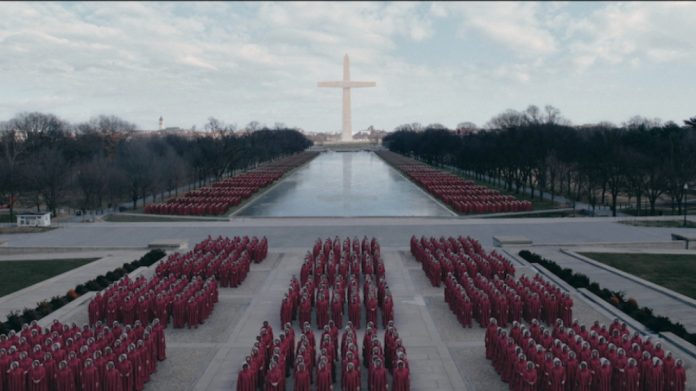In 1985, Margaret Atwood‘s novel The Handmaid’s Tale caused quite a stir with readers who devoured the futuristic dystopian story, in which the patriarchal society of Gilead captures free women, making them their procreating slaves. Among the page-turning bookworms was a young Bruce Miller, who discovered the book in a new fiction class in college and purchased a first-edition copy, which he cherishes to this day, crediting the tome as the catalyst for his own writing prowess.
The spell-binding story stayed with him for decades, through a writing career that began with NBC’s long-running hit ER, Syfy’s Eureka, and the CW’s The 100, until the timing was right to put pen to paper and adapt Atwood’s novel — now a bestseller — for Hulu, where the series debuted in April 2017 and is now approaching its sixth and final season.
In addition to creating the series, Miller serves as showrunner and executive producer of The Handmaid’s Tale, and he has a lot of fond memories to look back upon. Over the course of its first five seasons, the series won multiple Emmys and Golden Globes, while Miller forged a friendship with star Elisabeth Moss, who plays June Osborne/Offred, the rebellious handmaid who refuses to accept her sexual servitude. The two have become thick as thieves, with Miller handing “Lizzie,” as he affectionately calls her, the opportunity to direct several episodes herself.
Above the Line recently spoke with Bruce Miller via Zoom from his home in Los Angeles, where he is patiently waiting to begin production on the final chapter of The Handmaid’s Tale saga. Due to the ongoing Writers Strike, that start date remains in limbo, but when they do return to film the last episodes, one thing is certain — it will be strictly by the book, following the words of Margaret Atwood.
Miller discussed the importance of faithfully adapting Atwood’s novel for the screen, calling the author a friend. Though the end looms ahead, Miller enjoyed looking back to the beginning of the series, praising every department for their hard work and dedication, and reminiscing about the early designs of the handmaids’ costumes, as well as his own disbelief that he’d get to spearhead a series based on a book he loved as a teenager.
[Note: The following interview was conducted prior to the Writers Strike.]

Above the Line: Do you like my backdrop? What do you remember about this day when hundreds of extras descended upon Washington, D.C. to film a scene for Season 3?
Bruce Miller: I remember that I wasn’t there. We shot in Washington, D.C., and I was just too busy with writing and stuff to go, and we were only shooting for one day. It was very difficult to get it set up because the government was shut down for some ridiculous antics, and we couldn’t get the National Park Service to help. But eventually, we got it all together, and the thing that was just so stunning about it was that when we go out and shoot, even around Toronto, there aren’t that many handmaids. But this was 300 or something handmaids [in] full-on gear with their mouths covered in front of the Lincoln Memorial. We added more in post-production, and so the number of people watching was huge. We don’t usually get that.
And Lizzie [Elisabeth Moss] and Yvonne [Strahovski], who had a full workday of arguing like characters in that memorial in there, they’re both so excited to be there and then they have to turn that off! They stayed until every person got a picture or an autograph for what they needed. They stood on the stairs, and hundreds of people came by and took pictures of them. They were so excited to see that, and our people were so excited to see fans. They never see fans, so it was wonderful. I have glee about remembering all these things because the costumes, the production design, and Lizzy and Yvonne, [are all] at the top of their game.
ATL: Were you surprised that the fandom stayed so passionate through all these seasons?
Miller: I think a lot of that is a function of streaming and being able to catch up from the beginning whenever you want. Whatever pace they want, it’s going to be their experience, and it doesn’t have to be collective. So, I think it allowed a lot of people to catch up with the show and watch it live. It made the fandom a little bit more vibrant. New people kept coming in, and we experienced it in a very funny way.
I was at the Emmys the first year, and Millie Bobby Brown [from Stranger Things] came over to Yvonne and Lizzie and said, ‘I love you, but my mother won’t let me watch the show.’ And then two years later she came over and said, ‘I watched it! I watched it! I watched it!” It was the same scene at the Emmys where she was talking to Lizzie and Yvonne, and it was wonderful. She was so excited to talk to these actors, this young woman, and she had become a fan in the time the show had been on.
I’m not at all shocked that the fandom has lasted such a long time. However, because the fandom from the book lasted forever, the book had as many devout fans when the series got started as it had since the day it hit the bestseller list in 1987 or ’88 when it was quite a vibrant bestseller.
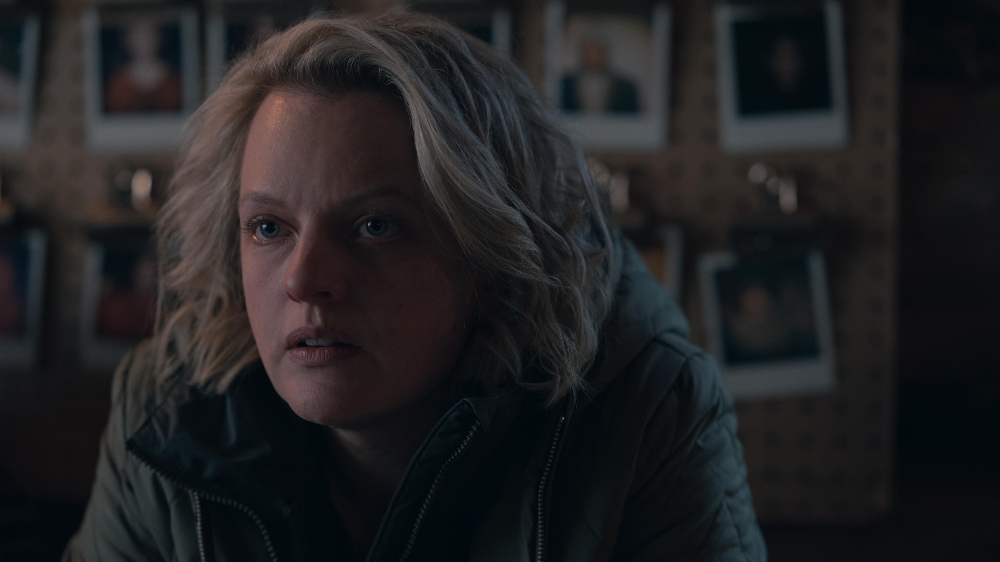
ATL: Why do you think Margaret Atwood’s novel made such a mark?
Miller: The very specific and thought-out decisions that Margaret made about constructing the world, the story, the characters, and the dynamics have stood the test of time. It’s a good example that this show — when we finish it up this year — is going to kind of be a nice thing to go between your Handmaids and (the novel’s sequel) Testaments on the bookshelf and stuff.
Then, hopefully, we’ll make The Testaments [for the screen], but to understand why those things are possible and why, hopefully, they’ll be good and rich, is because of Margaret. Because even Margaret, when she decided to do The Testaments, realized how much stuff was in there that she could mine. She’s, at her heart, a poet, and it’s all very wonderfully dense and complicated. You can think about it for a long, long time.
ATL: When did you first discover the novel The Handmaid’s Tale?
Miller: I, fortunately, read the book when I was in college — when it first came out. I read it in a new fiction class. That tells you how old I was. I had to go to the other part of the bookstore to buy it — not the textbook part, but the book part. And I still have the one I bought. It’s priceless to me. It’s a first edition; it’s probably worth $100 bucks, but that’s funny when you buy a first edition for class, which is a very odd thing.
So I read it, and I’m pretty dyslexic. I’m not a good reader at all — quite a poor reader — but I was an English major, and I had to do what everybody else did, which is read a book a week for every class. The way it was written really appealed to me in terms of clarity; I really understood what was going on in this woman’s head, and it was so focused on that. It was one of the first things that made me think about my own writing style. I was only 19 or 20 years old, and so she really helped teach me how to write.
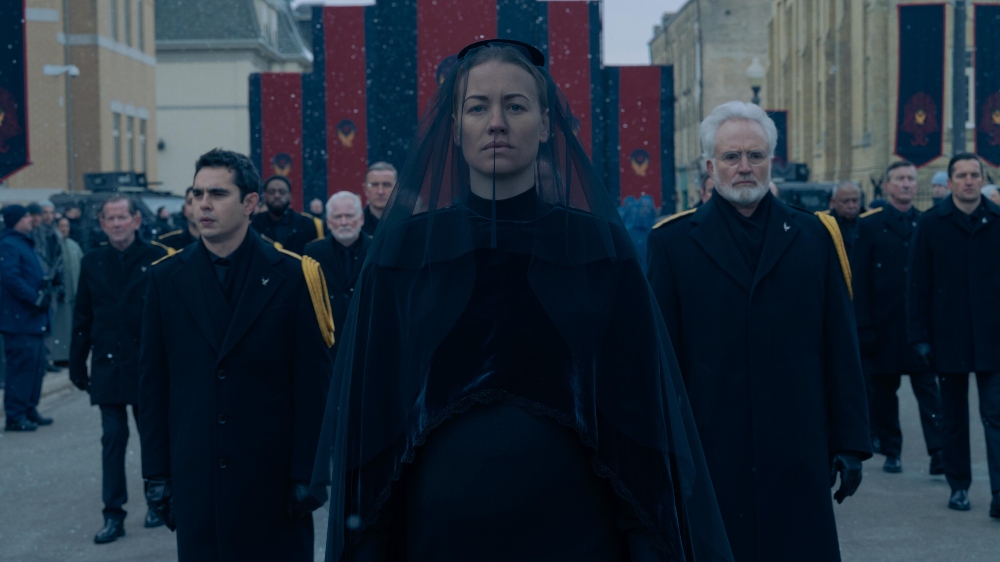
ATL: What was it about the book that you thought would make for good TV?
Miller: I’ve read that book 100 times over the years. I always thought, “Wow, it’ll make a good TV show someday.” And I was right. But I had no idea it would be me [making it]. I mean, other people have been doing it for a long time. I was just eager for it to happen because I was excited to see it — because the image of the hundreds of handmaids you have behind you [as your backdrop] was the image in my head. Wouldn’t it be cool to see it?
I had lots of opinions, but no resume. So, slowly, over the years, I built a resume, and very fortunately, [executive producer] Ilene Chaiken was successful doing lots of other shows, and I was able to come onto a project that she had kept alive and shepherded along for years. She is as responsible as any of the other producers for keeping this project alive for, you know, 20 years [since the book came out]. I really liked the book, and I wanted the TV show not to mess up the book for me, not for anybody else.
ATL: How ironic is it that you came to write a show based on a book you read when you were 20 years old?
Miller: It’s the way it should be all the time. When I talk to classes or whatever about kind of coming up with, not necessarily ideas for TV shows, but what are the things that really interest you, what are the things you do want to write about? It’s hard to say because I find that I always look at what’s sticky from my youth. Because now that I’m pushing 60, it’s nice to go, “Wow, that actually is sticky. That was really sticky.” Because I don’t have a fantastic memory. [However], this was something, just in terms of a few vivid images from the book, that really stuck with me. Being honest with myself about a) that it was sticky, and b) that this is what made it sticky — these moments — and I should put them on television.
For example, “The Ceremony” is a highly ritualized act of rape that high-ranking men, their wives, and their handmaids undergo to conceive children. which just seems so weird and was even weirder [when] acted by these three lovely people (Joseph Fiennes, Elisabeth Moss, and Yvonne Strahovski), with the lovely Reed Morano directing just the most gentle, wonderful actors, [and] trying to figure out the actual mechanics of the ceremony. You know, it was hilarious. They were like seventh graders laughing and giggling in there. It was wonderful, but that’s what I wanted.
I was like, “How the hell is that going to work?” [But] you get to talk it through and figure it out, so in some ways, it was a conversation I’d been having for a long time with myself. I think what did it was that, as my ability as a writer came along, that was a story I felt was really compelling. It felt inevitable, but it was never predictable.
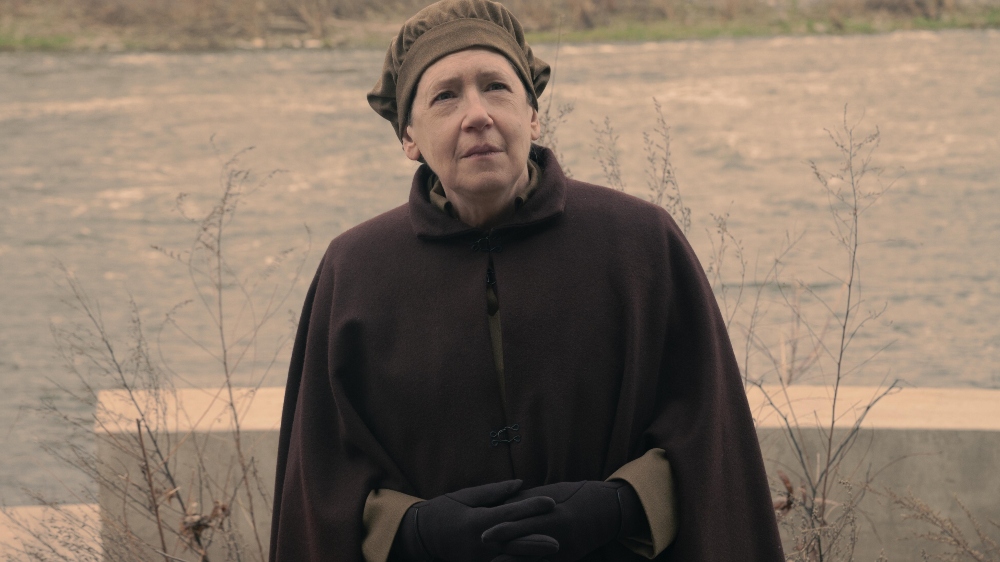
ATL: What other images from the book were the most challenging for you to bring to the screen?
Miller: In the book, it’s called the “particicutions,” which are a specific type of execution or salvaging in the Republic of Gilead. It’s interesting to see the nomenclature of Gilead and the things we’ve had to define like that. So I would say in terms of a sequence, the salvaging, where they tear apart a purported rapist, I have zero confidence that he was an actual rapist; I think he probably was a political person. We’re talking about the end of the pilot, when June and some other handmaids tear this guy apart, and June is very much at the forefront of that moment.
The hard part of this was going back to the book and saying, “Okay, these were the five things they mentioned; let’s show those five things.” Something about the book was sticky. those images, and there isn’t much in the book. And one of the things in the book is that the guy’s lying under the blanket when they walk away under a sheet, and then it’s kind of vague and not quite the right shape. They say that in the book. So there are a few things that I kind of took from that book and translated, and I didn’t try to get more complicated than that.
ATL: What about designing the handmaids’ costumes?
Miller: The other things that were the hardest to do were the costumes and putting them together. [From] Ann Crabtree, [who did] the first season, and going on to a number of excellent, excellent, excellent costumers and designers, what they’re wearing there has a front panel so it can be worn when you’re pregnant. So they’re always wearing maternity clothes. It’s built that way.
There are two cloaks — a winter and a summer cloak. All the cloaks are filthy on the bottom because they don’t have more than one cloak. They wear it, they wash it, and they all fade at different rates. “How do you make this headpiece? What’s under it when they take it off?” And so you come up with a zillion rules for all of those things, and then you put all that on, and what do you have [left] of Lizzie to shoot?
I mean, literally, you have her hands. She can move a little bit in there and make you sense that there’s a body in there, but not very much. And there’s this bonnet that covers their face. So how do you not make that a cave every time you shoot?
So one of the biggest problems was how to get light on Lizzie’s face when she’s actually in the shade and hidden the whole time. What they ended up doing is having a version of that headpiece that’s made out of very thin paper to the point where it lets a ton of light through, but it still looks white. So, of course, it would last two seconds if she were wearing it in the wind, but she never does. We only wear it when the camera is very close to her face. So there are all these problems that you don’t have in a book to solve, like that.
When you look at the annals of the Holocaust, even in the concentration camps, people style things up because the last individuality does not die so easily, and a sense of humor is one of the things that does not die so easily. So, people still make their outfits their own, and all the handmaids have their own slightly different way of wearing things. That shows that they’re rebelling a little bit.
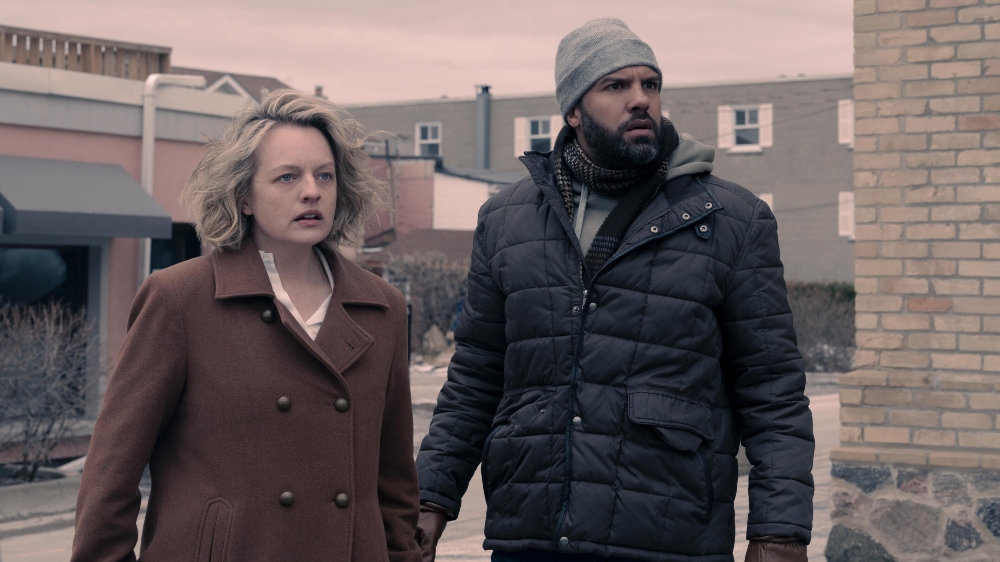
ATL: When you went to the set, which departments were your favorite to liaise with?
Miller: That’s very interesting. I do love to be on the set and in the production office. In a way, I can’t believe they’re paying me. I love everything about it, including the boring parts. I love getting there so early. I love staying there really late. I think that’s where Lizzie and I kind of crossed paths a little bit. She really loves that stuff and has incredible endurance. But the departments were really fun because they all had to have the same endurance, but they also had to relate to a bunch of different people.
I think that when someone comes in from outside to be on our show, they don’t get met by the director and me at the airport. They go through customs, and the first person they meet from my show is usually from the transportation department. My visits with the transportation department were hugely important because they are the first people.
They know where you’re driving, they know where to get food at 2:00 AM, they have a bottle of water and a script, and they’re nice and help you with your bag. They don’t meet anybody who’s kind of at the top of the food chain for days and days, and so they’re the people who really understand how to create an environment where someone can do their best work, and that starts with transportation.
Hair and makeup is [also] one of my favorite places to go, but I’m never allowed in there because I slow things down because I want to chat with everybody, but it is really gossip central. It’s first thing in the morning; no one has their guard up, and the best thing is that you see what your actors actually look like without makeup, with nothing on their face or their hair. It’s fun to feel like you’re part of the shooting part of it.
The grip electric department is a favorite of mine. My father is kind of tangentially involved in the film business. He sells colors and filters for lights, and so the directors of photography would come to my house to have dinner with my dad. So I had heard it all from their point of view along the way because my father had seen the world from that point of view. I still very much look at the set in terms of how far you have to carry sandbags, how far you have to run cable, and all of that stuff. All it is is creating a beautiful bubble for the actors to act in where they don’t [have to] think about anything [else].
ATL: I love that you call Elisabeth Moss, “Lizzie.” What surprised you most about working with her as her talents continued to develop over the years?
Miller: With Lizzie directing, she came to me and asked. You have to come to me if you want to do something, you know, and you have to be at least willing to ask. I had been thinking about it for two and a half years before she even opened her mouth. I had kind of played through scenarios and watched her as an actor and as a producer, and I was waiting for her to feel like she had the desire.
It’s not fair to say, “Here you have this giant plate of food, and I know how much you love to eat, so here’s some more food.” That’s not nice; that’s mean. So she had to want to add more to her plate and find a way to do it in conjunction with her other responsibilities. She found a way to be [an] executive producer [largely] in charge of acting, which is her other job, and directing.
I was surprised about two things. I was surprised about how good her eye was, which is being able to understand how to move the camera to make something cool onscreen, which I don’t understand. She could really translate from the other side because she had been standing on the other side as an actor, so she knew what was going to happen. She had an incredibly good three-dimensional eye, and that includes a beautiful eye for color and contrast. She is also incredibly stylish and girly, and she really understands how to shoot people and make them look pretty. You see her on set directing, and she’s up in the face of all these [grips and electricians] and she’s perfectly in charge of herself.
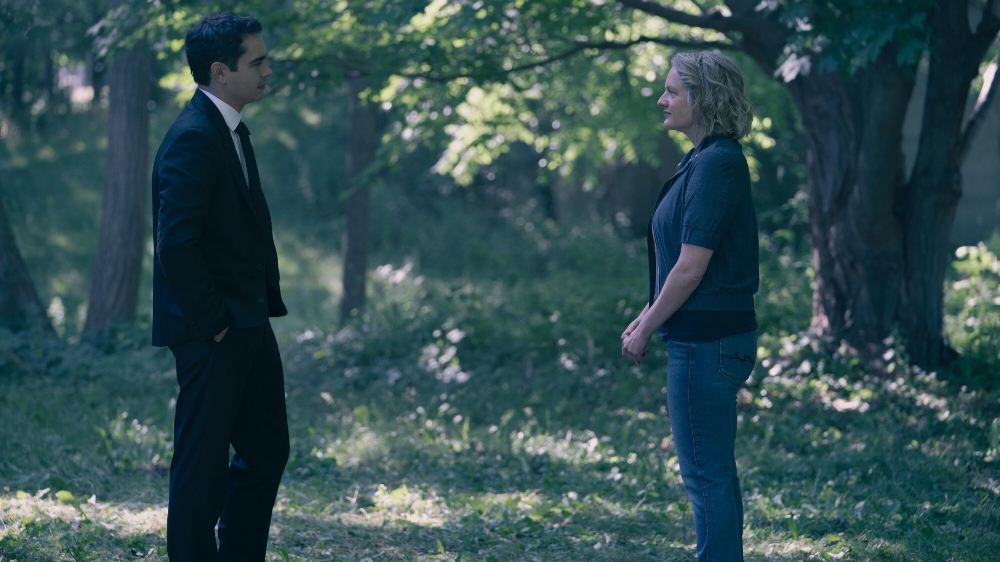
ATL: When you say people have to come to you and ask for what they want, how would you describe your management style?
Miller: My management style is that I’m allergic to walking on eggshells. I don’t like any of that stuff. I need normal humans, and I can’t have any drama in my drama.
ATL: With Season 6 approaching, how are you envisioning the end?
Miller: I’m absolutely not going to top the other seasons and go out with a bang. I’m going to follow June the way I follow June all the way along and follow her to the stories that she’s going to go to. This has been a very interesting show all the way along. None of the things that were supposed to happen at certain points have happened at those points because it’s not the handmaid’s myth, and it’s also not the handmaid’s reality show. It’s her tale. And it’s the tale from her point of view, and the shape of it is going to be her shape, not mine, but the character’s shape. You’ve got to think of what it’s like for June as a storyteller because, in this particular case, she’s controlling the whole narrative.
At the end of the first season, when we were doing the second season, we were incredibly lucky to get a ton of accolades. And then you get back to your office, and you have an Emmy sitting in front of your keyboard, and you can’t type around it because it’s too big, and it’s like, “Oh my God!” So you have to learn how to take it and just say, “Okay, that was incredibly nice; now I gotta just do my fucking job. It took me a while to realize it’s us who are going to [have to] do it again, and the way we do it is to not put any pressure on it. It’s going to be as good as we can make it. Hopefully, if any one of the episodes is as good as any one of the episodes we’ve made, I will feel like it’s a huge success. This has been an incredible artistic experience, and we are going to continue to do that.
The nice thing is that we had a book to go from, so we knew from Day 1 what we would do. It’s all super intimidating, but once you adapt Margaret Atwood’s book, oh my God, that was so intimidating. I mean, I loved that book, and then she read my script, and then I had to meet her. I was so nervous. If she said, “Eh,” I would just cease being able to write ever again. I would just vanish into ashes. Now, she’s my actual friend, and I adore her, and she’s hilarious.
And so when you come to the end of it, it’s not intimidating. I’m very, very emotionally upset about the idea of not working with these people anymore and doing anything else with my life, just because it’s been so steady and so steadily good for so long, especially me and my writers, and me and my office staff.
But the writers and the actors — me and Lizzie, in particular, because she was a producer from the beginning — I can’t tell you how rewarding it’s been just knowing her as a person. And when we move on, I’m sure that she’ll be working very hard with other people and that kind of thing, so in that part, I’m very emotional about the ending of that. But I don’t feel pressure to end the other part. I just have to kind of make it cool for me. Listen, if you read the book, you know exactly what happens at the end.
The first five seasons of The Handmaid’s Tale are now streaming on Hulu, where Season 6 is in the works.


